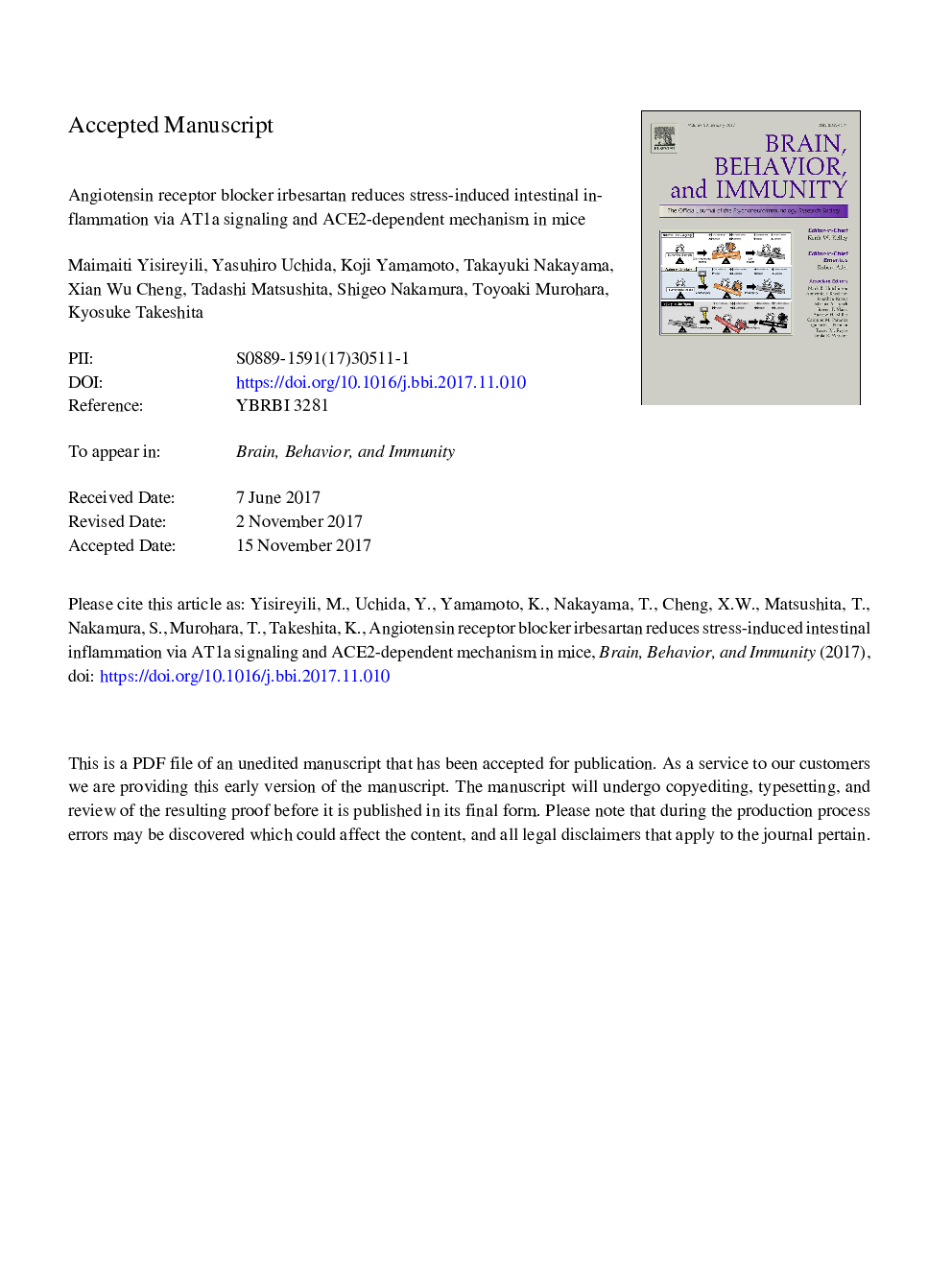| کد مقاله | کد نشریه | سال انتشار | مقاله انگلیسی | نسخه تمام متن |
|---|---|---|---|---|
| 7279394 | 1473897 | 2018 | 48 صفحه PDF | دانلود رایگان |
عنوان انگلیسی مقاله ISI
Angiotensin receptor blocker irbesartan reduces stress-induced intestinal inflammation via AT1a signaling and ACE2-dependent mechanism in mice
دانلود مقاله + سفارش ترجمه
دانلود مقاله ISI انگلیسی
رایگان برای ایرانیان
کلمات کلیدی
موضوعات مرتبط
علوم زیستی و بیوفناوری
ایمنی شناسی و میکروب شناسی
ایمونولوژی
پیش نمایش صفحه اول مقاله

چکیده انگلیسی
Stress is associated with pathophysiology of both irritable bowel syndrome (IBS) and hypertension. Angiotensin receptor blockers (ARB) have anti-inflammatory properties via inhibition of angiotensin II (Ang II)/Ang II type I receptor axis (AT1). Inhibition of the classical RAS pathway is also involved in upregulation of angiotensin converting enzyme-2 (ACE2), which activates the Ang-(1-7)/Mas pathway to counteract inflammatory signaling and acts as a partner of the amino acid transporter, B0AT-1, to absorb tryptophan for regulation of microbiota-gut-brain axis. In this study, we determined the effects of ARB irbesartan on stress-induced intestinal inflammation. C57BL/6J mice were subjected to 2-week intermittent restraint stress. They were orally treated during the stress with either vehicle, 3 or 10â¯mg/kg/day irbesartan. Restraint stress resulted in colon inflammation with higher histological damage scores, increased expression of Nox4, TLR-4 and IL1-β, accumulation of reactive oxygen species (ROS), and activation of the ACE-angiotensin II-AT1 receptor axis. Stress also downregulated intestinal amino acid transporter, ACE2/B0AT-1, and activity of intestinal mammalian target of rapamycin (mTOR) and p70 S6 kinase (p70S6K), resulting in decrease in α-defensins, changes in intestinal microbial contents, and perturbation of tryptophan metabolism with activation of the kynurenine pathway. Administration of irbesartan inhibited activation of stress-induced AT1 pathway to reduce intestinal ROS accumulation and inflammation, restored expression of ACE2/B0AT-1, activity of mTOR and p70S6K, dysbiosis and tryptophan metabolism. Our results suggest that AT1 is a potentially suitable therapeutic target in stress-induced intestinal inflammation, and that irbesartan could be beneficially suitable for the treatment of stressed patients with IBS.
ناشر
Database: Elsevier - ScienceDirect (ساینس دایرکت)
Journal: Brain, Behavior, and Immunity - Volume 69, March 2018, Pages 167-179
Journal: Brain, Behavior, and Immunity - Volume 69, March 2018, Pages 167-179
نویسندگان
Maimaiti Yisireyili, Yasuhiro Uchida, Koji Yamamoto, Takayuki Nakayama, Xian Wu Cheng, Tadashi Matsushita, Shigeo Nakamura, Toyoaki Murohara, Kyosuke Takeshita,